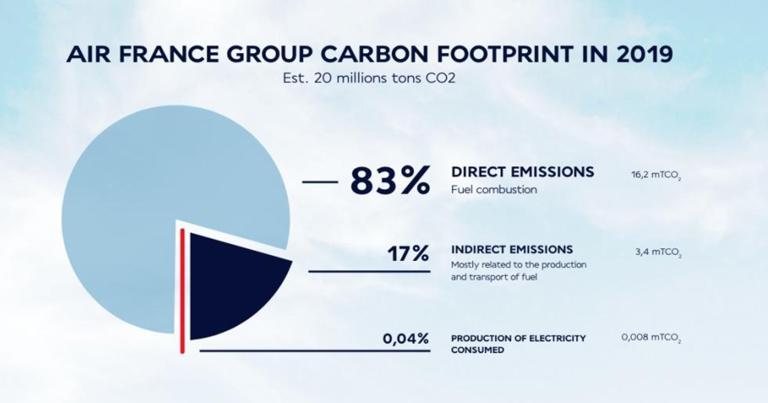
Air France has launched a new programme, called “Air France ACT”, setting out the airline’s new CO2 emissions reduction strategy. The new strategy builds on the objectives of the Paris Agreement, which aims to limit global warming to below +2°C.
This strategy is based on three priorities:
- Reducing the direct emissions generated by Air France operations
- Reducing indirect emissions, generated upstream and downstream of the company’s activities
- Supporting projects that absorb CO2 from the atmosphere
The new decarbonisation trajectory targets a 30% reduction in CO2 emissions per passenger/km by 2030 compared to 2019. This objective excludes offsetting actions to consider measures that exclusively reduce direct and indirect emissions. It corresponds to a 12% reduction in the company’s total emissions between 2019 and 2030, in line with expected changes in activity, after a 6% reduction achieved between 2005 and 2019.
By 2050, Air France aims to achieve net-zero emissions, which would mark a drastic reduction in its CO2 emissions coupled with contributions to projects that will remove from the atmosphere a quantity of CO2 equivalent to residual emissions each year. The company is working to define a precise and verifiable decarbonisation trajectory for 2050, based on a set of hypotheses – notably concerning an evolution of traffic – which may vary. Therefore, this is an evolving process, guided by the ambition to be in line with the scientific benchmarks, as is the case for the trajectory for 2030.
To achieve these goals, Air France is setting up the following priorities:
- Fleet renewal with new-generation aircraft ‑ Airbus A220, Airbus A350 – more fuel-efficient, emitting up to 25% less CO2, and a noise footprint reduced by 33% on average. By 2030, these aircraft will make up 70% of the Air France fleet compared to 7% currently thanks to an investment policy of one billion euros per year between now and 2025.
- Increased use of Sustainable Aviation Fuel (SAF), which will reduce CO2 emissions by 80% on average over the fuel life cycle, and not create competition with food production. Since 2022 and in accordance with French regulations, Air France has been incorporating the equivalent of 1% sustainable aviation fuel on all its flights departing from France. By 2030, the company aims to incorporate at least 10% SAF on all its flights, and 63% in 2050.
- Eco-piloting techniques: taxiing using only one of the engines whenever possible, optimised flight paths using artificial intelligence, continuous descent in cooperation with the air traffic control authorities, to name but a few. These initiatives, made possible by the efforts of Air France flight crews trained in these practices, reduce CO2 emissions by 2% to 3% on average over the year.
- Introduction of a more responsible catering offer, to reduce the carbon footprint. On board flights and in the lounges, Air France favours local, seasonal produce whenever possible. The company also offers customers a pre-selection of dishes before the flight in the long-haul Business cabin, as part of its active commitment to reducing food waste. In addition, by the end of 2022, Air France will have eliminated 90% of single-use plastics compared to 2018, after having replaced in 2019 plastic cups, cutlery and stirrers with sustainable alternatives.
- Developing intermodal transport, to offer low-carbon transport alternatives for short distance journeys, notably within a reinforced partnership between Air France and SNCF.
Moreover, to raise awareness of its commitments, Air France has launched a video campaign and a dedicated “Air France ACT” website.







